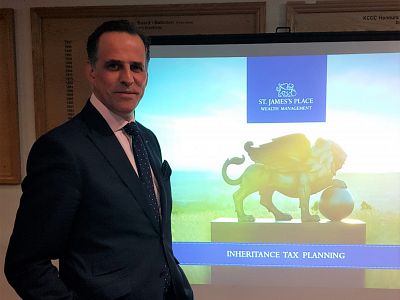"Do you dislike your children more than you dislike the taxman?" - this was the intriguing title that Peter Bobb gave to his presentation when he came to talk to us about inheritance tax planning the other day.
Peter lives in Canterbury and has, in fact, visited our Club before as a guest at some of our events. But, on this occasion, he came to us to talk about a topic that he has a great deal of experience in through running a financial planning company in Maidstone.
By 2023 it's estimated that around £6.3 billion will be collected by the taxman in the shape of inheritance tax - and yet the chances that people "dislike their children more than the taxman" are slim! So why is so much tax going in the taxman's direction? From Peter's talk it's clear a lot of that is due to poor inheritance tax planning.
Inheritance tax is defined as "a tax on the transfer of assets (if UK domiciled) in life or death that reduces the value of an estate." Peter told us that while a lot of inheritance tax is collected following death - we were surprised to learn that there are certain situations in which inheritance tax is paid during a lifetime.
Peter's goal for the evening was to help us gain a better understanding of inheritance tax planning so that we can make "good decisions". Although inheritance tax planning can be a complex subject, there are a few simple things that we can all think about.
It seems there are several options that people may choose:
- do nothing, and let the next generation sort things out;
- put a plan in place to reduce the value of the estate over time;
- put a plan in place to pay the liability on someone's behalf when it arises;
- spend it all;
- give some or all of the value of assets away to charity.
The first thing we should think about is whether what happens to our estate after we're gone is important to us. If so, we need to plan ahead. "Without planning," Peter told us, "you could be waving goodbye to up to 40% of your estate."
We also need to think about what might happen in the future - for instance if a child were to divorce after an estate has been passed on, a large proportion of an estate could just "walk out of the door" as part of a divorce settlement.
In planning for the future, we also need to think about the needs of various people - for instance, a particular family member might have special needs that need to be provided for.
Another thing Peter recommended (where feasible) is to discuss plans with family members. "Families," Peter asserted, "are very important when we think about inheritance tax planning." He illustrated this to us with reference to his own family during his talk.
It seems that calculating inheritance tax is complex but, basically, the total value of assets is calculated and then two "rate bands" subtracted - the nil rate band and the residence nil rate band. Peter gave us examples of different situations to illustrate calculations. Someone who is single with no children of their own may have more inheritance tax payable on their estate that a married couple with kids.
As to who ensures the payment is made - this is done by the executor of the will and has to be done by the end of the 6th month after the death. Therefore, executors should be chosen with care - they need to be able to understand and manage this process.
Peter ended his talk with a list of ten top things we should all do:
1. Make a will.
2. Get someone to help us work out the value of our estate (assets can include homes, other property, cash, heirlooms etc.)
3. Note down what gifts have been made in the last 14 years.
4. Identify if any assets are subject to inheritance tax exemption (for instance, some agricultural lands).
5. Become aware of gifting allowances including gifts for marriage and income out of normal expenditure which doesn’t affect your standard of living.
6. Understand what a gift with reservation of benefits is (you can't give something away and continue to enjoy the benefit of it; for instance, you can't give away a property but continue to live there rent free).
7. Take advice on when it’s a good time to start planning, and establish some objectives.
8. Establish what control you need over the assets in the future.
9. Think about who to involve in decisions.
10. And, finally, sleep well at night!
With that Peter brought his talk to a close, with one last reminder that planning what will happen after our death is probably "one of the biggest decisions people will ever make in life".
Picture: Peter came to talk to our members about inheritance tax. Picture credit: Rotary Club of Canterbury.



